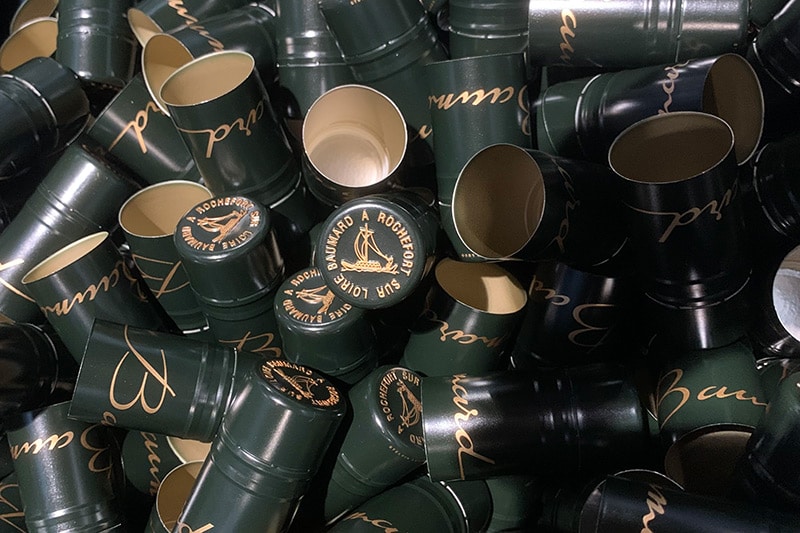Taste the wine, not the cork.
For a long time, the so-called "cork taste" was a poorly understood phenomenon.
How many disappointments it has caused! A bottle chosen and reserved for a family event or to celebrate a success smelled of "cork" and was ready to be thrown away.
This phenomenon accelerated as the cork market grew and had to supply not only the old-fashioned European wines, but also the so-called "new world" wines. Cork manufacturers had to expand their supply of cork and process the corks to increase production.
For two decades, this has resulted in the appearance of light false tastes, some of which are then attributed by the consumer not to the cork but to the work of the producer. Whereas undeniably, these effects, as nuanced as they are perverse, are due - it is certain - to the cork.
Specialists agree that 3 to 7% of bottles are depreciated in this way.
In France, the use of the cork and the corkscrew is almost a rite. Wine lovers believe that they are necessary to satisfy a wine connoisseur and by an old-fashioned reflex are keen to observe it.
As long as there were no technical possibilities to do better, it was understandable.
All the more so as the alternative processes, such as plastic corks, had many disadvantages (uncorking or re-corking was sometimes difficult), or that treated or agglomerated corks had false tastes.
A corking process: the screw cap, which has been used for a long time in Switzerland, a country that is rigorous and precise about quality, can now replace the cork.


The screw cap : practical advantages in relation to the cap.
Unscrewing the cap is simple. A left-hand turn is all it takes to open the bottle, without effort, without having to search for an instrument, without any cork debris falling into the bottle. The opening is clean and without burrs.
Re-capping the bottle is easy. A turn to the right and it's done.
Housewives will appreciate these advantages and will surely be the best people to prescribe this system.
The screw cap :quality advantages over the cork.
Neutral and more airtight.
The seal is perfect. This puts an end to the so-called "leaky" bottles that result from the fact that cork is a heterogeneous material.
The oxidation, more or less great according to the air pocket left between the cork and the wine, and the quality of the cork no longer exists. The quality is homogeneous for all the bottles of the same batch.
The reactivity between the wine and the tannin in the cork is eliminated. This is a source of turbidity or light deposits that disappear.
The aromas, freshness and fruit of the wine are preserved and the wine will age naturally according to its own qualities.

So what could be wrong with screw caps?
As long as the system is not generalised, there will be an additional cost from the bottles, whose necks must be special to receive the cap. There is also an additional cost for the machines needed for capping, which is currently in the order of 15 to 20%.
But this will disappear for wine as it has for liqueurs, whiskies, fine spirits, and even for the quarts of Champagne served by airlines.
Also at the beginning, a simpler presentation than the one used today on the capsules covering the corks.
But all this has nothing to do with the essential purpose of a good cork: to preserve the quality of the wine.
Currently, the cork is given priority over the wine.
This is no longer acceptable.
The producer must protect the quality of his wine. Especially since cork taint is a danger of the last hour. The producer must not resign himself to losing everything at the last moment, even though he has done everything to ensure the best quality.
The percentages of risk of bad taste have become too great to remain in the status quo.
Better solutions are needed, which technical progress now allows.
The modern consumer has to accept and understand the quality protection that the screw cap brings to the wine, and therefore to himself.
Will he, for purely irrational reasons, keep the "cork taste" for his own use when we will be delivering our great wines all over the world with the assurance of no cork taste?
We hope that good taste will remain French.
Saying yes to the screw cap means saying no to the cork taste.
Ageing: preconceived ideas.
The screw cap, argue its opponents, would prevent ageing, stopping it artificially through lack of oxygen. However, this essential phenomenon in the evolution of a wine takes place in the absence of oxygen, as has been observed for a quarter of a century.
"Oxygen is not the agent of normal bottle ageing".
Jean Ribereau-Gayon, 1976, in "Traité d'oenologie - Sciences et technique du vin" vol 3.
"Bottle ageing corresponds to an evolution of the wine in a state of reduction, towards a superior organoleptic quality, the one it had at the beginning".
Pascal Ribereau-Gayon, 2000, in "Traité d'oenologie "vol 2.
The evolution of a wine does not require oxygen. The wine develops its organoleptic capacities in a reductive environment where it acquires superior qualitative properties. These words, by Pascal Ribéreau Gayon*, should put an end to the stereotypical views that would make oxygen the indispensable element for the improvement of a wine.
* Traité d'oenologie 2000
the opinion of a professional taster
Michel Bettane | "Revue du Vin de France" | March 2004
Following various tastings of white and red wines, matured and vinified in different styles, he concluded that
"All the capped wines showed great precision in the definition and rendering of aromas on the nose and, on the palate, a greater respect for textures and shapes than the same capped wines traditionally, not to mention total consistency from one bottle to the next."
For or against? ... screw caps
One in six bottles worldwide is now closed with a plastic cap or screw cap. This proportion continues to rise, particularly for caps. They now seal more than a billion bottles a year. In Australia, almost all "bottles" offered in restaurants, even vintage wines, are sealed in this way. The system is simple, easy, allows you to take your wine with you..., and has even given good results in tastings, where the taste of the cork had become an obsession. That said, other alterations, linked to oxidation-reduction, have aroused the attention of professionals. But nothing can be done about it: the capsule is making progress. In France, will it be soon?
Text by Vincent Noce.
Gérard MARGEON
Executive Head Sommelier - Alain DUCASSE Group

We are very much in favour of the cap.
In Spoon, there are zero corks. And zero bottle returns. At the Plaza Athénée, we were the very first to offer Michel Laroche grands crus closed with a screw cap, eight years ago. For red wines for ageing, we may not have enough experience yet. But for whites or entry-level wines, which we decant in advance, I have no doubt.
A cork stopper, you never know where to put it or what to do with it. It represents a big expense: you should know that a good cork is worth between 1.90€ and 2.20€.
The capsule is great!
And some of them are quite beautiful now. There may be risks of reduction, it's true, but they are minimal compared to the taste of the cork.
As for the solemn gesture of the sommelier, who lights a candle, uncorks the bottle and smells the cork, it has always annoyed me.
Tim Kopec
Wine Director - Veritas, Manhattan.
I have no problem with offering a wine closed by a capsule.
We have a restaurant with a strong focus on wine, with 3,500 references and 192,000 bottles in the cellar, the selection of which has won us major prizes. We open the bottle at the pedestal table, so the customer doesn't necessarily see the cap.
Real fans understand.
In Australia, New Zealand and Austria, it appears everywhere, without any complexes. In New York, people are still divided. The capsule is reserved for wines costing less than $100 a bottle (about €70); it would not be accepted on a Château Lafite.
It should be noted that cork taint is a catastrophe for professionals: it reaches 6% to 10% of what we serve.
With the capsule, we have 0% false taste.
On the other hand, for wines for ageing, caution is required because we don't always have enough hindsight to judge the evolution. But it is a factor of modernity.
Alain DUTOURNIER
Chef du Carré des Feuillants

Let it be said that I have no nostalgia for cork, for which I have no esteem.
That said, the capsule seems to me to be suitable for ordinary wines, a Muscadet that one drinks with oysters between friends. So no scruples there! But, in restaurants, it is difficult to banish the cork, which is still very popular with French customers.
However, we tasted a magnum of La Conseillante from 1953, which was wonderful. It had just been protected by the pewter capsule, and had aged very well.
We drank some superb 1949s closed with sparkling water capsules, because there was a lack of cork at the time.
So those who defend the cork fantasy at all costs are fetishists, in my opinion.
But there is an element of dream. In restaurants, it's important.









